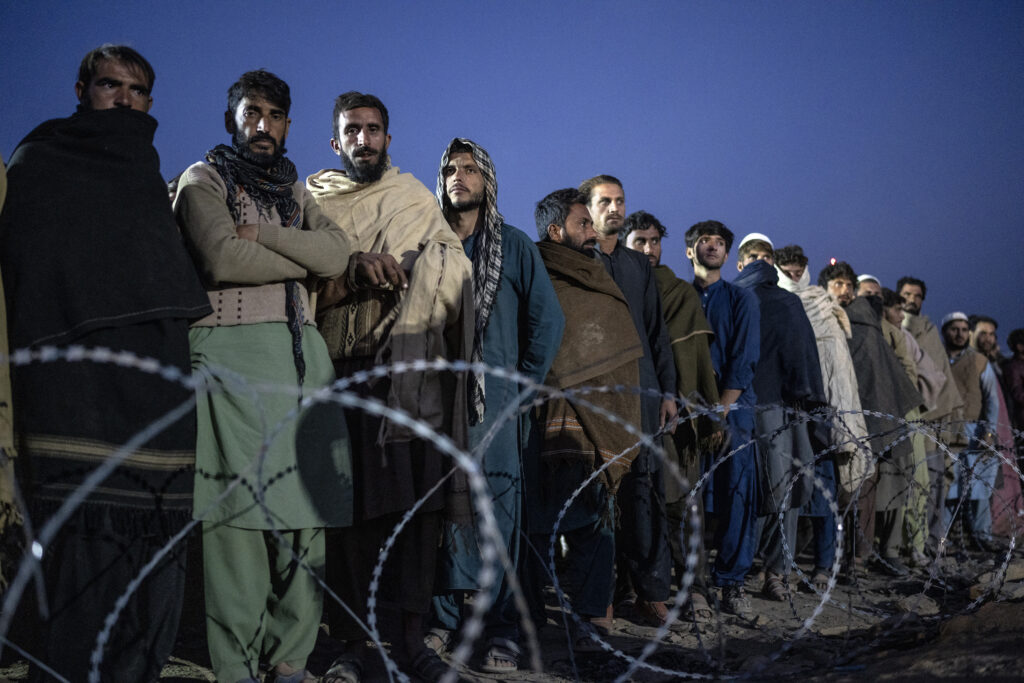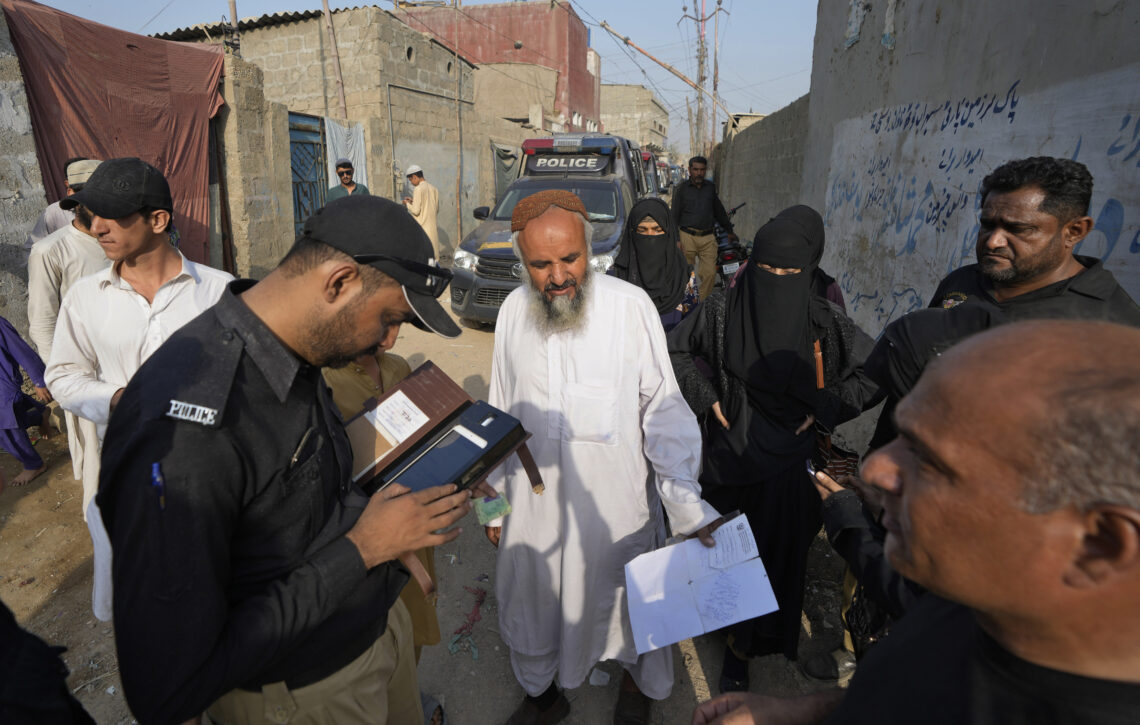By Wilson Liévano
In early November, the Pakistani government started to round up and deport undocumented Afghan refugees, as part of an immigration crackdown that has drawn criticism from the United Nations and relief agencies.
There are approximately 2 million undocumented Afghans in Pakistan, many of whom arrived decades ago and built a life for themselves in the country and who don’t have anything to return to. Some are recent arrivals due to the Taliban’s rise to power in Afghanistan and for them, returning to their country could place them in danger.
Several cases of abuse and intimidation of refugees by the Pakistani police have also been reported, adding to the urgency of the crisis. More than 370,000 Afghans have been expelled so far and although Pakistan’s Supreme Court has agreed to hold a hearing on the topic after human rights groups filed a petition, the mass deportations continue.
“There will be no compromise against illegal refugees. We have the data on who are staying illegally in Pakistan. We are going door to door, and we have done geofencing. We will detain and deport them. We have arrested dozens across the country so far, including in the capital,” said Pakistan’s acting interior minister, Sarfraz Bugti back in early November.
We spoke with Tayyeb Afridi, Director of News & Innovation for our Report for the World partner Tribal News Network and with our corps member Fahim Afridi, who shed light on the political, social and economic ramifications of the deportations based on their extensive coverage of this ongoing crisis. Their responses have been edited for length and clarity.
Report for the World: For those who are not familiar with the story, can you tell us what has led to the deportation of hundreds of thousands of Afghans who were living in Pakistan?
Afridi: The decision to deport undocumented Afghan refugees is attributed to concerns about public order, particularly instances of terrorism, and economic factors such as dollar smuggling, as stated by authorities. Analysts, however, argued that the expulsion of Afghan refugees is primarily a response to the Afghan Taliban’s reluctance to act against the proscribed Pakistani Taliban known as TTP – Tehreek-e-Taliban Pakistan.
Additionally, there is speculation that after deportation of undocumented Afghan refugees, Pakistan is also planning to send those who have Proof of Registration or registered. Pakistan says it holds the authority to deport refugees, including Afghan refugees, at its discretion, as it is not a signatory to the 1951 Geneva Convention.
Two types of Afghan refugees have been living in Pakistan. The first type is those who have been living in Pakistan for decades whose parents migrated in 1979 when Russia invaded Afghanistan. Some of them are registered while others are not. Those who are not registered are being sent or in the process of sending. The second type is those who arrived after the fall of Kabul to the Taliban. Again, some of them have registered themselves or have proper visas while others haven’t. Those who are not registered are being sent back.
To many, it is a political fallout between two countries, triggered by the fact that Pakistan demands action against Pakistani Taliban residing in Afghanistan. Pakistan says it has evidence that Pakistani Taliban are involved in terrorism in Pakistan.
RFW: Why has the government decided to expel Afghans now, after many of them have been living in the country for decades?
Afridi: Concerns about anti-Pakistan sentiments among Afghan refugees, both in Afghanistan and particularly in Pakistan, are being highlighted in this context. Criticism has arisen over the behavior of Afghan refugees towards Pakistan, notably during recent cricket matches. However, the underlying reasons remain consistent with those outlined in response to the first question.

RFW: What will be the social and economic impact of expelling so many people at once for Pakistan?
Afridi: The evacuation of Afghan refugees is already leaving significant social and economic impacts, with daily reports indicating the adverse effects on various industries. A key factor contributing to this impact is that a substantial portion of Afghan refugees are not merely laborers but actively engage in their businesses. Besides their involvement in vegetable and fruit markets, numerous refugees also played a crucial role in the transport sector. The repercussions of their departure are now evident in the disruption of these sectors, extending to businesses such as antique trade and human hair commerce.
Moreover, the social consequences of the evacuation are beginning to surface. A recent incident in Nowshera involved the tragic killing of a 24-year-old Pakistani wife by her Afghan husband, triggered by her refusal to relocate to Afghanistan. Such incidents and their societal repercussions are anticipated to unfold over time.
RFW: How have you approached the coverage of this story for your audience? What have been the angles you have focused on? Does this story intersect with the environmental beat? If so, how?
Afridi: From the beginning of the decision to evacuate Afghan refugees until the present moment, Tribal News Network (TNN) has been diligently covering this multifaceted issue.
As we delve into the environmental beat, it unfolds with dual perspectives – one centered in Afghanistan and the other in Pakistan, each warranting an examination of its impact on the environment. The repatriation of refugees to Afghanistan is anticipated to present challenges, yet it may also yield positive effects on the environmental landscape, particularly in Khyber Pakhtunkhwa, Pakistan.
In the Pakistani context, it becomes imperative to scrutinize whether there will be a discernible alleviation of pressure on local resources. Furthermore, exploring the rehabilitation of displaced ecosystems, waste reduction and management, shifts in land use, and the resilience of communities in the face of these changes is crucial. Simultaneously, monitoring the environmental impact stemming from this evacuation remains a focal point of our coverage.
For a more in-depth understanding of the issue, check out some of TNN’s coverage:
- KP Police to Launch Operation Against Refusing Migrants
- Renewal Delays of Afghan Nationals’ ID Cards Pose Challenges in KP
- Khyber Pakhtunkhwa’s Lucrative Hair Trade: A Global Hub for Premium Strands
- 490 Families Lead Ongoing Exodus: Afghan Refugees Return via Torkham
- Fading Charms: Peshawar’s Historic Shinwari Market Hit by Foreigner Exodus
- Afghan Woman Fears Starvation and Education Loss If Forced to Return
- Crackdown Begins on Illegal Foreign Residents in Pakistan
- Symbol of Return: Baby “Watan Rawan Khan” Born in Afghan Refugee Camp
- Tragic Shooting Unfolds as Woman Resists Forced Afghan Exodus


